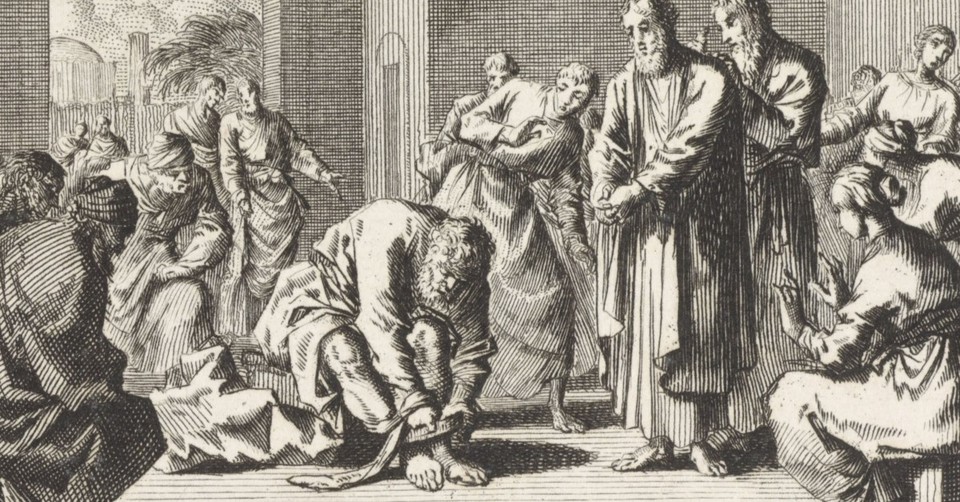3 Lessons on Prophecy and Faithfulness from Agabus

Christians may be familiar with well-known prophets in the Bible, such as Jeremiah and Daniel, but we may not be as familiar with prophets who take up less space on the page, such as Agabus. Agabus is only mentioned twice in the Bible, but we can still learn about receiving prophetic messages from these few words. Let’s dig deeper into Agabus’s story and the lessons we learn from him.
What Does Agabus Warn Paul Will Happen in Jerusalem?
A prophet’s job was to declare moral and spiritual truth, sometimes about larger political or cultural events. In Agabus’ case, his prophecy predicts something that will affect many countries. Acts 11:28 states, “Agabus stood up one day and, prompted by the Spirit, warned that a severe famine was about to devastate the country. (The famine eventually came during the rule of Claudius.)” The International Standard Bible explains that the country named in the prophecy could be identified as The Roman Empire, and there is evidence of famines occurring during the rule of Claudius.
It’s important to note that Agabus gave this warning when prompted by the Spirit. The revelation was not something of his own or for selfish benefit. The Spirit of God spoke through him to warn the people and give them time to prepare. Because of the warning, the disciples decided to help the Christians affected. Acts 11:29 says, “So the disciples decided that each of them would send whatever they could to their fellow Christians in Judea to help out.” This prophecy allowed Christians to come to one another’s aid and help them in a time of need.
Does the Bible Mention Agabus Making Any Other Prophecies?
Agabus makes another prophecy later in the book of Acts. This time, the prophecy is specifically for Paul, who is going to Jerusalem. Agabus warns about Paul’s impending imprisonment and suffering.
“After several days of visiting, a prophet from Judea by the name of Agabus came down to see us. He went right up to Paul, took Paul's belt, and, in a dramatic gesture, tied himself up, hands and feet. He said, ‘This is what the Holy Spirit says: The Jews in Jerusalem are going to tie up the man who owns this belt just like this and hand him over to godless unbelievers.’” (Acts 21:10-11)
Again, it can be noted that Agabus speaks on behalf of the Holy Spirit. He demonstrates the tribulations by taking Paul’s belt and tying himself with it. This leaves a greater impression than simply speaking the prophecy. As with the earlier prediction of the famine, Agabus’s announcement allows Paul to prepare himself for the hardships ahead. He won't be surprised when suffering comes his way and will be as ready as possible in those circumstances.
What Does Christian Tradition Tell Us about Agabus?
The Bible does not give us much background about Agabus; however, Christian tradition believes that Agabus was one of Jesus’s 70 disciples. Christianity.com states, “Early Christian writings, such as The Church History by Eusebius and The Apocryphal Acts of the Apostles, list Agabus as one of the 70 disciples.” These disciples were different from the apostles. They were regular people Jesus sent to heal the sick and preach the Gospel.
“After this, the Lord appointed seventy-two others and sent them two by two ahead of him to every town and place where he was about to go. He told them, “The harvest is plentiful, but the workers are few. Ask the Lord of the harvest, therefore, to send out workers into his harvest field” (Luke 10:1-2).
Matthew Henry suggests we can assume several characteristics about the 70 disciples—characteristics that would also apply to Agabus. We can assume the disciples chosen were familiar with Christ’s teachings, had seen Jesus’s miracles, and believed he was the Son of God. We can also assume that they were concerned for the souls of fellow men and desired to see others come to Christ.
Henry goes on to explain that the tasks assigned to the seventy disciples served specific purposes. Luke 10:9 says, “Heal the sick who are there and tell them, ‘The kingdom of God has come near to you.’” First, seeing men healed would spread belief in Christ’s authority and cause bystanders to long to know him. Second, preaching the Gospel gave witnesses an opportunity to accept Christ. They were told about Jesus and that they could believe in him.
Why Does Paul Go to Jerusalem Despite Agabus’s Warning?
Despite Agabus’s warning, Paul still goes to Jerusalem. Instead of taking the warning as a reason to change plans and not go, the prophecy confirms his call to go. Paul is willing to follow God’s plans even though he knows the journey will result in hardship and imprisonment. Acts 21:13 states, “Then Paul answered, “Why are you weeping and breaking my heart? I am ready not only to be bound but also to die in Jerusalem for the name of the Lord Jesus.”
Following God is more important to Paul than personal comfort. He declares that he is ready for what is to come and goes beyond Agabus’s prophecy saying he is ready to die for the name of Jesus. While Paul could not have predicted the entire future, looking back, we can see the good that came from his suffering. Paul was willing to follow God no matter what. When he did that, he did end up in jail, where we wrote several letters that are included in the Bible. Paul may not have known his imprisonment would lead to authoring part of the most popular book in the world, but he did know it was for a purpose.
What Can We Learn from Agabus about Prophecy?
We can learn several things from the story of Agabus in the Bible.
1. Prophecy prepares God’s people for the future. Prophets receive divine messages from God to share with his people. In the Old Testament, the prophets predicted the coming Messiah to prepare them for the coming Savior. When Jesus came and fulfilled these prophecies, the people could be confident he was the Messiah. Both of Agabus’s prophecies also helped prepare those involved. When he predicted the famine, Christians were able to know ahead of time so they could plan to help those affected. Without the warning, many could have suffered and died from starvation. With Agabus’s warning, he prepared Paul mentally for his trials but also confirmed God’s plans for Paul’s life. After hearing Agabus’s words, Paul was even more determined to preach the Gospel, even if it meant losing his life.
2. Prophecy is a gift from God. The gifts of the Spirit are presented in 1 Corinthians 12. Among them is listed the gift of prophecy. Agabus was given this gift to spread messages of God to others. Christianity.com says, “Prophecy, when exercised responsibly and in accordance with biblical principles, serves to strengthen the faith of believers, foster a deeper understanding of God's will, and contribute to the spiritual growth and unity of the Church.” In Agabus’s first prophecy, we see how the church unified. Christians came together to help one another in the time of famine. In his second prophecy, Agabus’s words strengthen Paul’s conviction that he is to go to Jerusalem even though hardship awaits him.
3. God is faithful through prophecy. Confirmation of Agabus’s prophecies is recorded in the Bible. Acts 11:28 verifies the famine that occurred during Claudius's reign, and the disciples were able to help the people of Judea. Other writers confirm a famine occurred during this time as well. In Agabus’s second prophecy to Paul, he predicts Paul will be imprisoned and endure suffering. This occurs later in Acts 21. Besides throwing him in jail, verse 31 states that “they were trying to kill him.” In Acts 22, he was flogged and interrogated but released when the commander realized he was a Roman citizen.
The Biblical stories surrounding Agabus give us better insight into the role of prophecy. God bestows gifts of the Spirit, including prophecy, to aid believers here on earth. A famine was prophesied, and it occurred. Paul’s suffering was prophesied, and it happened. Jesus’s second coming was prophesied, and it will happen. Prophecy is divine and not of this world, but God gives people these messages to help prepare us for the future.
Photo Credit: Public domain print by Jan Luyken

Jenna Brooke Carlson is an elementary dual language teacher in the Chicago suburbs. As a member of American Christian Fiction Writers and Word Weavers, she enjoys spending time with other writers and perfecting her craft. Her debut novel, Falling Flat, spreads the message that healing can occur, even after tragedy. Along with writing, she’s pursuing her dreams of creating a community of brave young women, who she can encourage to live out their dreams amid challenges and imperfection. Her days are busy, but she’s determined she can conquer anything with a fuzzy blanket and a hot cup of tea. To find out more about Jenna, visit her website at jennabrookecarlson.com.
This article is part of our People from the Bible Series featuring the most well-known historical names and figures from Scripture. We have compiled these articles to help you study those whom God chose to set before us as examples in His Word. May their lives and walks with God strengthen your faith and encourage your soul.
4 Things You May Not Know About Abraham in the Bible
20 Facts You May Not Know About Moses from the Bible
Who Was Mary Magdalene in the Bible?
Who Were the 12 Disciples of Jesus?
Who Was Isaiah & Why Was He Important?
Originally published July 29, 2024.







